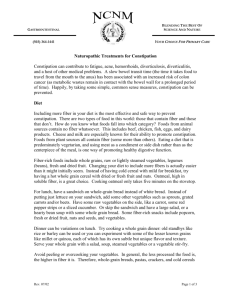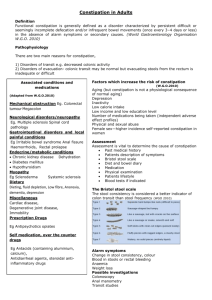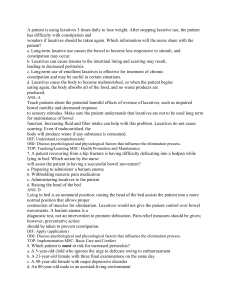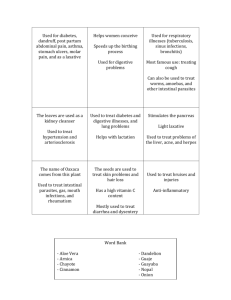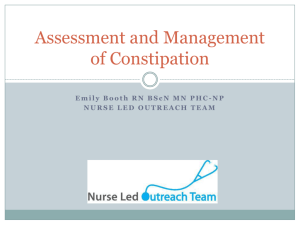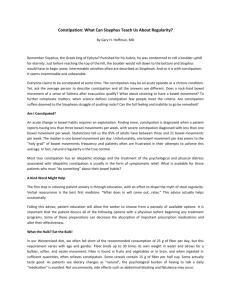Ex-Lax
advertisement
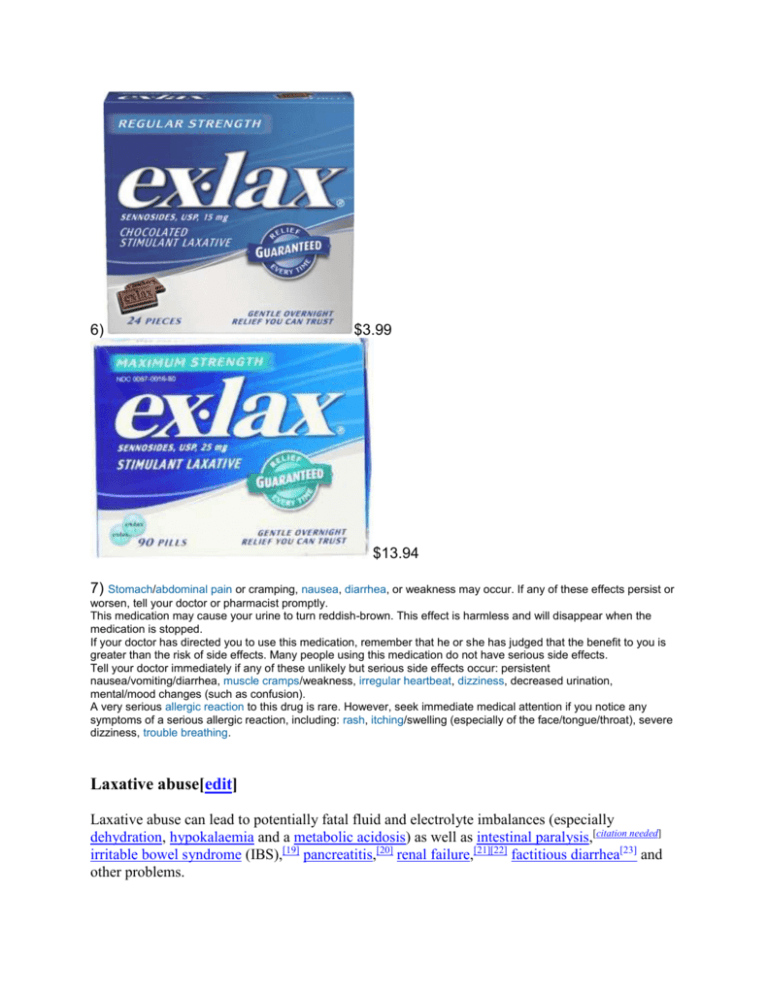
6) $3.99 $13.94 7) Stomach/abdominal pain or cramping, nausea, diarrhea, or weakness may occur. If any of these effects persist or worsen, tell your doctor or pharmacist promptly. This medication may cause your urine to turn reddish-brown. This effect is harmless and will disappear when the medication is stopped. If your doctor has directed you to use this medication, remember that he or she has judged that the benefit to you is greater than the risk of side effects. Many people using this medication do not have serious side effects. Tell your doctor immediately if any of these unlikely but serious side effects occur: persistent nausea/vomiting/diarrhea, muscle cramps/weakness, irregular heartbeat, dizziness, decreased urination, mental/mood changes (such as confusion). A very serious allergic reaction to this drug is rare. However, seek immediate medical attention if you notice any symptoms of a serious allergic reaction, including: rash, itching/swelling (especially of the face/tongue/throat), severe dizziness, trouble breathing. Laxative abuse[edit] Laxative abuse can lead to potentially fatal fluid and electrolyte imbalances (especially dehydration, hypokalaemia and a metabolic acidosis) as well as intestinal paralysis,[citation needed] irritable bowel syndrome (IBS),[19] pancreatitis,[20] renal failure,[21][22] factitious diarrhea[23] and other problems. Although patients with eating disorders such as anorexia nervosa and bulimia nervosa frequently abuse laxatives in an attempt to lose weight, laxatives act to speed up the transit of faeces through the large intestine, which occurs subsequent to the absorption of nutrients in the small intestine. Thus, studies of laxative abuse have found that effects on body weight reflect primarily temporary losses of body water rather than energy (calorie) loss [24][25] Laxative gut[edit] Physicians warn against the chronic use of stimulant laxatives due to concern that chronic use causes the colonic tissues to get worn out over time and not be able to expel feces due to longterm overstimulation.[26] A common finding in patients having used stimulant laxatives is a brown pigment deposited in the intestinal tissue, known as melanosis coli.[ Gastrointestinal Gastrointestinal side effects have included esophageal impaction and duodenal bezoars. These effects have been reported in patients receiving a bulk laxative product containing 82% psyllium and 18% senna (the active ingredient contained in Ex-Lax) (commercially available as Perdiem Overnight Relief). Hypersensitivity Hypersensitivity side effects have rarely included occupational sensitization to senna (the active ingredient contained in Ex-Lax) One case has been reported involving a factory worker who developed IgE-mediated asthma and rhinoconjunctivitis five months after exposure to senna. Musculoskeletal Musculoskeletal side effects have rarely included finger clubbing. 8) A) Small and large intestine Takes about 12–72 hours b) Key words: stool softener (surfactant) Cholecystokinin is a peptide hormone of the gastrointestinal system responsible for stimulating the digestion of fat and protein http://www.ece.ncsu.edu/imaging/MedImg/SIMS/GE1_2.html What Causes Constipation? Not enough water intake Not enough fiber intake not enough exercise too much dairy Stress Resisting the urge to have a bowel movement Overuse of laxatives (stool softeners) which, over time, weaken the bowel muscles Hypothyroidism Neurological conditions such as Parkinson's disease or multiple sclerosis Antacid medicines containing calcium or aluminum Medicines (especially strong pain medicines, such as narcotics, antidepressants, or iron pills) Depression Eating disorders Irritable bowel syndrome Pregnancy Colon cancer - Colonic inertia. A condition in which the colon contracts poorly and retains stool - Obstructed defecation. A condition in which the person excessively strains to expel stool from the rectum
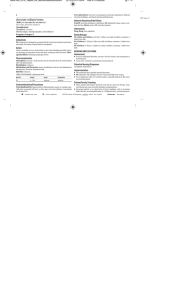

![Community Eating Disorders [CEDS]](http://s3.studylib.net/store/data/007648073_2-1353b9c3bbd6e629dd785305e6b76e05-300x300.png)
